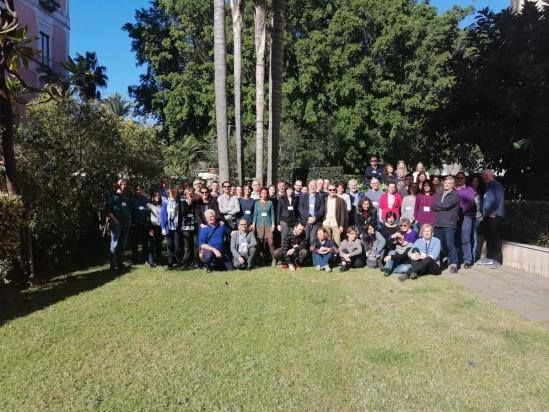Between January 27 and 31, 2020, the 2nd Annual Meeting of the European program “European Network of Observatories and Research Infrastructures for Volcanology” (EUROVOLC) took place in Catania, Italy.
The main goal of the three-year (2/2018–2/2021) competitive project EUROVOLC, funded with a total budget of €5 million under HORIZON 2020 and with the participation of the H.S.G.M.E. from Greece, is to enhance networking and reduce fragmentation among the volcanological research and monitoring structures across Europe.
The initiative also aims to coordinate and optimize both the equipment used in multi-parameter volcano monitoring networks and the software tools for managing, analyzing, and evaluating the data, to ensure reliable and accurate conclusions that can support authorities responsible for civil protection.
To achieve these objectives, four thematic action pillars have been established: Community Building, Volcano–Atmosphere Interaction, Subsurface Processes, and Volcanic Crisis Preparedness and Management.
During the four-day meeting (27–30/1/20), representatives of the European volcanological community summarized and discussed the project’s 2019 activities and results, and agreed on the main directions for achieving the program’s goals by its completion in February 2021.
Among the most noteworthy preliminary results presented were:
- Real-time detection and forecasting of volcanic activity evolution through continuous monitoring of volcanic tremors, hours before an eruption occurs.
- Software tools for precise reprocessing of microseismicity data in near real time.
- Algorithms for automatic determination of topographic deformation caused by volcanic activity using satellite imagery (InSAR) and high-precision GNSS data.
- Correlation of seismic–acoustic infrasound records to predict explosive events during volcanic unrest, only minutes before they occur.
- Free online access to software and computational infrastructure for modeling volcanic processes and explosive phenomena.
- Co-eruptive petrological monitoring methods for assessing magma characteristics and their evolution during eruptive events.
The first edition of the “Catalogue of European Volcanoes” was also presented and will soon be available online through the EUROVOLC portal.
Among the 2019 activities considered particularly successful were:
- The workshop held on February 5–7, 2019, in Exeter, UK (home of the London VAAC), bringing together volcanic observatories, research centers, and Volcanic Ash Aviation Centres (VAACs) from Toulouse and Washington, with the goal of improving coordination and communication protocols. A follow-up meeting is planned for June 2020 in Toulouse, France.
- The Summer School of Volcanology held on Mount Etna in September 2019 on the topic “Understanding Subsurface Volcanic Processes.” A similar summer school is planned for Iceland in August 2020, focusing on “Explosive Volcanism.”
The meeting concluded on January 31 with a field visit to Mount Etna, where participants explored key sites related to the program’s actions and objectives.
From Greece, the program’s coordinator for H.S.G.M.E., Volcanologist Dr. Giorgis Vougioukalakis, Head of the Department of Natural Disasters at H.S.G.M.E. and President of the Institute for the Study and Monitoring of the Santorini Volcano, took part in the meeting.


